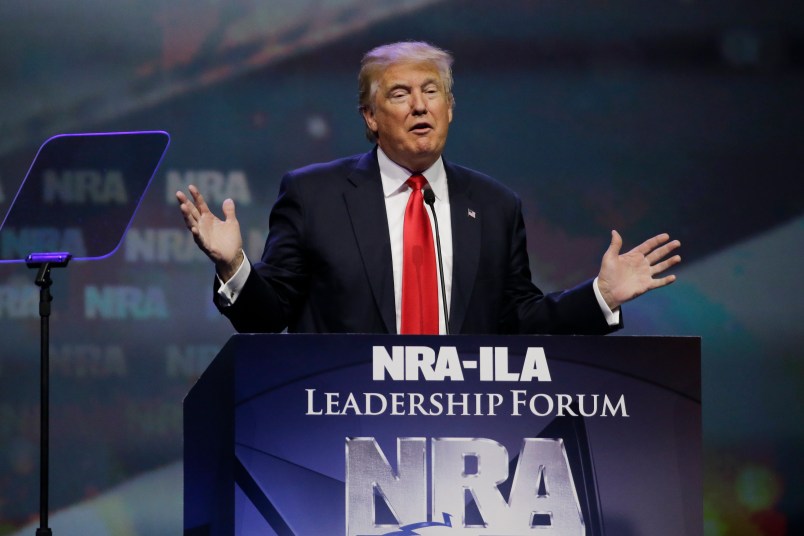The FBI is reportedly probing whether a Russian banker with ties to the Kremlin illegally funneled money to the National Rifle Association (NRA) to help Donald Trump’s 2016 presidential campaign.
But if the gun lobby did take Russian money, it likely couldn’t have done it without a determined campaign by Republicans, with a major assist from the Supreme Court, to weaken laws governing money in politics. To fully understand the news about the FBI’s probe, we need to first understand how the effort to gut campaign finance laws has left the U.S. deeply vulnerable to foreign money infiltrating our elections.
“Citizens United opened up the floodgates to any kind of corporate money,” Craig Holman, a campaign finance expert at good government group Public Citizen, told TPM. “It’s easy to launder foreign money through corporate entities or LLCs, and it goes entirely unreported as coming from foreign sources.”
McClatchy reported that Maria Butina teamed up with Paul Erickson, a Republican operative and NRA member, to set up an LLC, named Bridges, in February 2016. Butina is a top aide to the Russian banker, Alexander Torshin, who is a long-time ally of the NRA. Erickson told McClatchy last year that the company was created in case Butina needed financial help for her graduate studies in the U.S. McClatchy described that as “an unusual way to use an LLC.”
TPM has laid out the web of ties between Torshin, Butina, and top NRA figures.
Foreigners are barred from contributing to U.S. political campaigns. But the Supreme Court’s 2010 Citizens United ruling, which allowed corporations to spend unlimited amounts on political activities, fueled a spike in the number of 501(c)(4) “social welfare” non-profits, which are permitted to spend big on political campaigns without disclosing the source of their funds. That makes it hard for government watchdogs or federal agencies to know with certainty if foreign money is being funneled to these so-called “dark money” groups
Campaign finance advocates and prominent Democrats warned about the danger back in 2010.
During his first State of the Union address that year, Obama cautioned that the Citizens United ruling, which had come days earlier, “will open a floodgate for special interests — including foreign corporations — to spend without limits in our elections.”
In response, Justice Samuel Alito, seated in the audience, mouthed “not true.” His disagreement was echoed by Capitol Hill Republicans and conservative organizations, who argued that the existing legal prohibition on foreign corporations spending money on U.S. campaigns would be sufficient (though no one disputed that they could now do so through their American subsidiaries).
Even Politifact called Obama’s claim “mostly false.”
But Larry Noble of the Campaign Legal Center told TPM that the law is now easy to get around. 501(c)(4)s are required to file reports including the donor’s name if money comes in that is expressly earmarked for an ad boosting a particular candidate. But as long as the non-profit doesn’t divulge the specific content of an ad to the donor, no disclosure is necessary.
Anonymity, of course, would be appealing to those like Torshin, the Russian banker whose activities are reportedly under investigation by the FBI.
Neither the NRA nor Butina, the Torshin aide, responded to TPM’s request for comment.
Noble said any case against Torshin or the NRA would be complex. The FBI will have to look through “bank records, the money coming in, where it went,” Noble said. “And try to trace it through to what it was spent on. Beyond that, you want to know who was involved with it, what they discussed with foreign nationals, who approached who, what were their understandings.”
No dark-money group spent more on the 2016 election than the NRA’s dark-money arm. In all, the NRA spent a $55 million on the campaign, including $30 million to support Trump. And because non-profits don’t need to reveal how much they spend on Internet ads or get-out-the-vote efforts, a more realistic estimate of the NRA’s total spending could creep as high as $70 million, according to McClatchy.
The $30 million spent in support of Trump is twice what the group spent to back Mitt Romney in 2012, despite its well-publicized loathing for President Barack Obama.
If Russians did use the NRA as a conduit to financially support Trump, a whole new set of questions opens up.
“This NRA spending, if it turns out to be true, is it unique?” asked Ciara Torres-Spelliscy, a campaign finance expert at Stetson University. “Did they try to push it through other opaque non-profits?”
After all the months searching for incontrovertible evidence of pro-Trump Russian intervention in the 2016 election, the answers to those questions, Torres-Spelliscy said, could be “the holy grail.”







Does this investigation also address how the money was spent? I have heard that the NRA was given assistance on where to spend the funds - notably in states like Michigan, Wisconsin and Pennsylvania.
Also: Is the Pope Catholic?
"Even Politifact called Obama’s claim “mostly false.”
Those Pinnoccios all had brown noses.
Better question here is; DID RUSSIA HELP PROMOTE CITIZENS UNITED IN THE FIRST PLACE FOR THIS VERY REASON?
Sure fits their pattern. Now we know how long they’ve been cultivating traitorous Republican allies, we need to look back at a whole lot of legislation and see where their fingerprints still linger.
Any old Secretary of State could provide them with that kind of info, and Kobach comes to mind.
Foreign influence by establishing U.S. corporations to funnel money to campaigns was a very publicly predicted and feared consequence of upholding CU back when it was being decided. This should surprise no one.